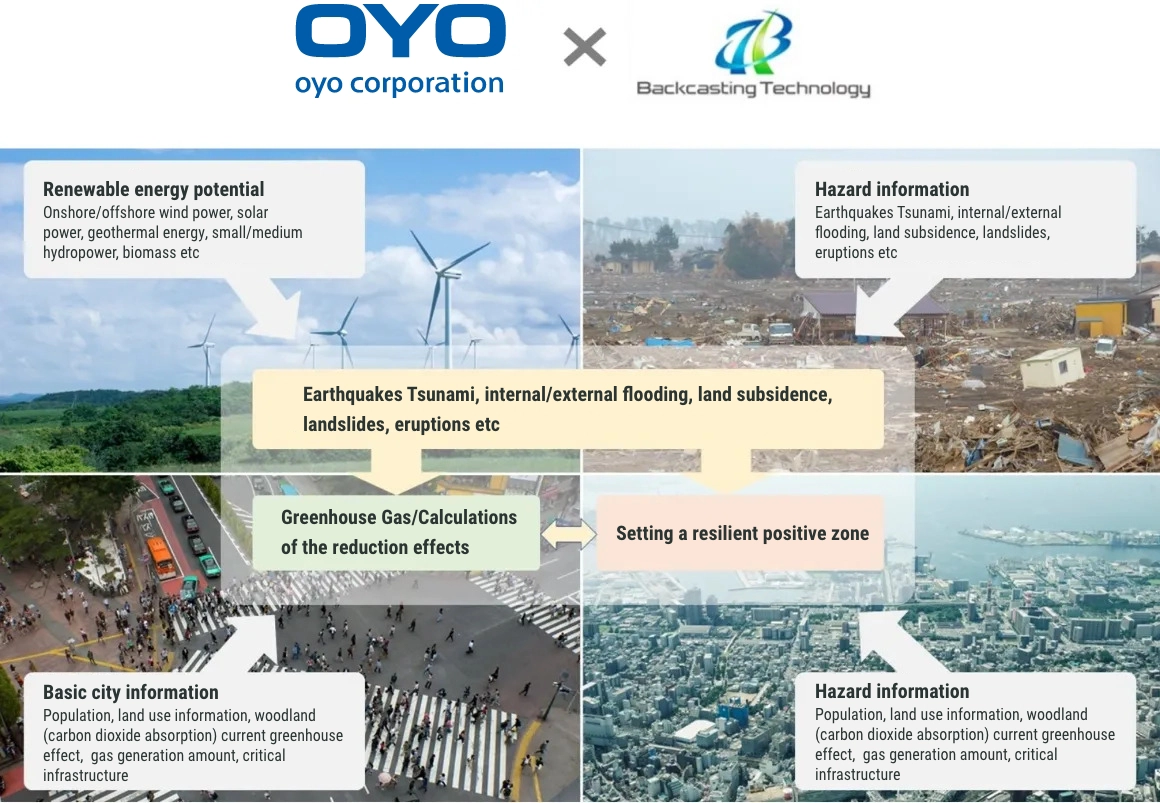Our Initiatives to Achieve Social Sustainability Through Open Innovation
We are currently facing various social and environmental challenges such as climate change, increasing natural disasters, an aging population, rapid infrastructure aging and resource and
energy issues. Moreover, these challenges are becoming increasingly complex, intertwined with each other, and difficult to address through the efforts of individual companies or government
initiatives alone, given the advanced nature of our social and economic structures.
The OYO Group has been actively pursuing comprehensive solutions in response to these challenges. In our mid-term management plan, "OYO Jump18" established in 2018, we emphasized our
intention to collaborate with companies and institutions both within and outside the Group, including those in different industries. Furthermore, in our current mid-term management plan,
"OYO ADVANCE 2023," we have formulated an innovation strategy centered on digital transformation (DX) and are driving business service reforms based on the premise of co-creation with
other companies, government entities, and universities.
Currently, governments and companies worldwide are working on various initiatives to achieve the Sustainable Development Goals (SDGs) by 2030. To accomplish these SDGs, it is essential to
create solutions to address these challenges through open innovation that transcends industry and organizational boundaries. On this page, we will introduce some of our initiatives to
address the social and environmental challenges and work toward achieving the SDGs through open innovation.
Disaster Prevention Consortium "CORE"
Cross-industry cooperation
Our company, along with 14 other companies, including Tokio Marine & Nichido Fire Insurance Co., Ltd., established the Disaster Prevention Consortium "CORE" in November 2021 (now joined by
57 companies). Recognizing the increasing and intensifying natural disasters due to climate change, the consortium aims to fuse technologies across industry boundaries, accelerate and
promote new disaster prevention and mitigation efforts in line with the "Fundamental Plan for National Resilience". This includes the creation and market development of new services.
As part of CORE's subcommittee activities, we are currently leading the development of the "Real-time Hazard Map" in collaboration with Tokio Marine & Nichido Fire Insurance Co., Ltd.,
SECOM Co., Ltd., and PASCO Corporation. The Real-time Hazard Map utilizes real-time information from disaster prevention IoT sensors, social media networks (SNS), as well as AI for
capturing signs and conditions of disasters from existing security cameras and other sources. This system allows residents and businesses to experience the arrival of disasters in
real-time, aiming to achieve "zero evacuation failures" and minimize damage.
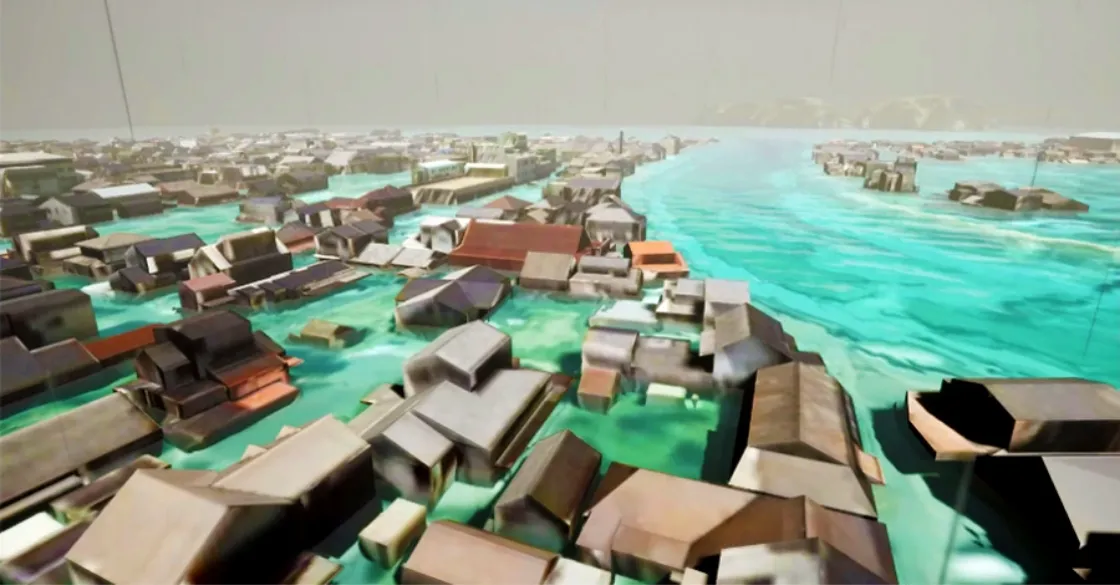
Image of real-time hazard map
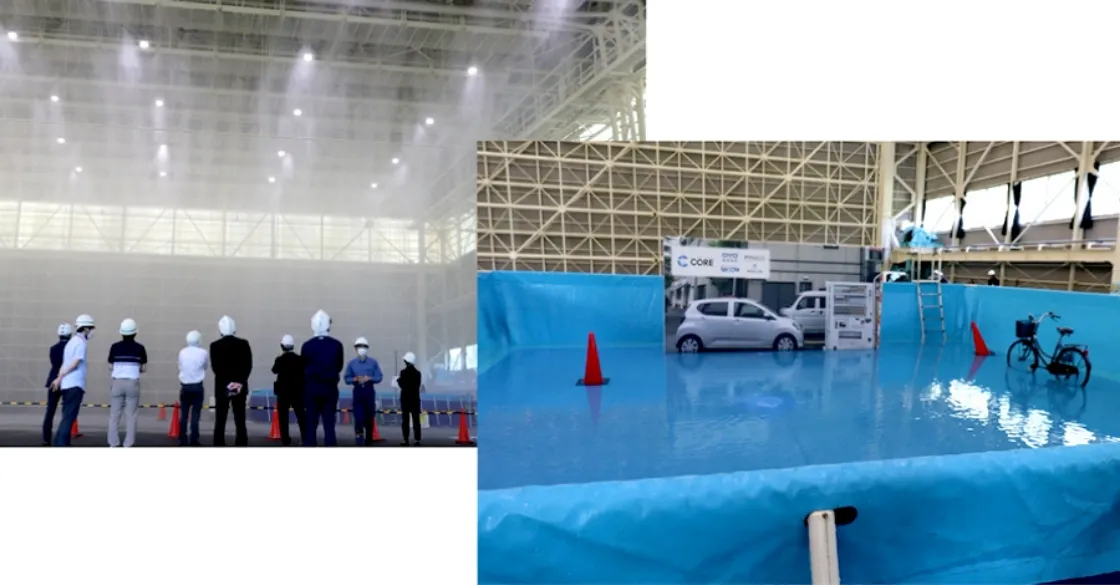
Demonstration experiment of the security camera video footage and the disaster prevention IoT sensor at the large-scale rainfall experiment facility at the National Research Institute for Earth Science and Disaster Prevention
Collaboration agreement on disaster prevention community development with Hayama Town, Kanagawa Prefecture
Public-private partnership
Due to the impacts of climate change and other factors, the damages incurred from heavy rains are increasing nationwide. The town of Hayama in Kanagawa Prefecture has serious concerns regarding landslides and soil erosion on its steep slopes. To protect residents from such natural disasters, we signed a cooperation agreement with the town of Hayama and initiated empirical research to establish a new disaster prevention system. We have installed and are running our "Slope Movement Detection Sensors" and "Sediment Disaster Hazard Monitoring System" to verify the effectiveness of early detection of the signs of soil erosion and establish optimal methods to inform residents of evacuation actions based on the detected information regarding the premonitions.
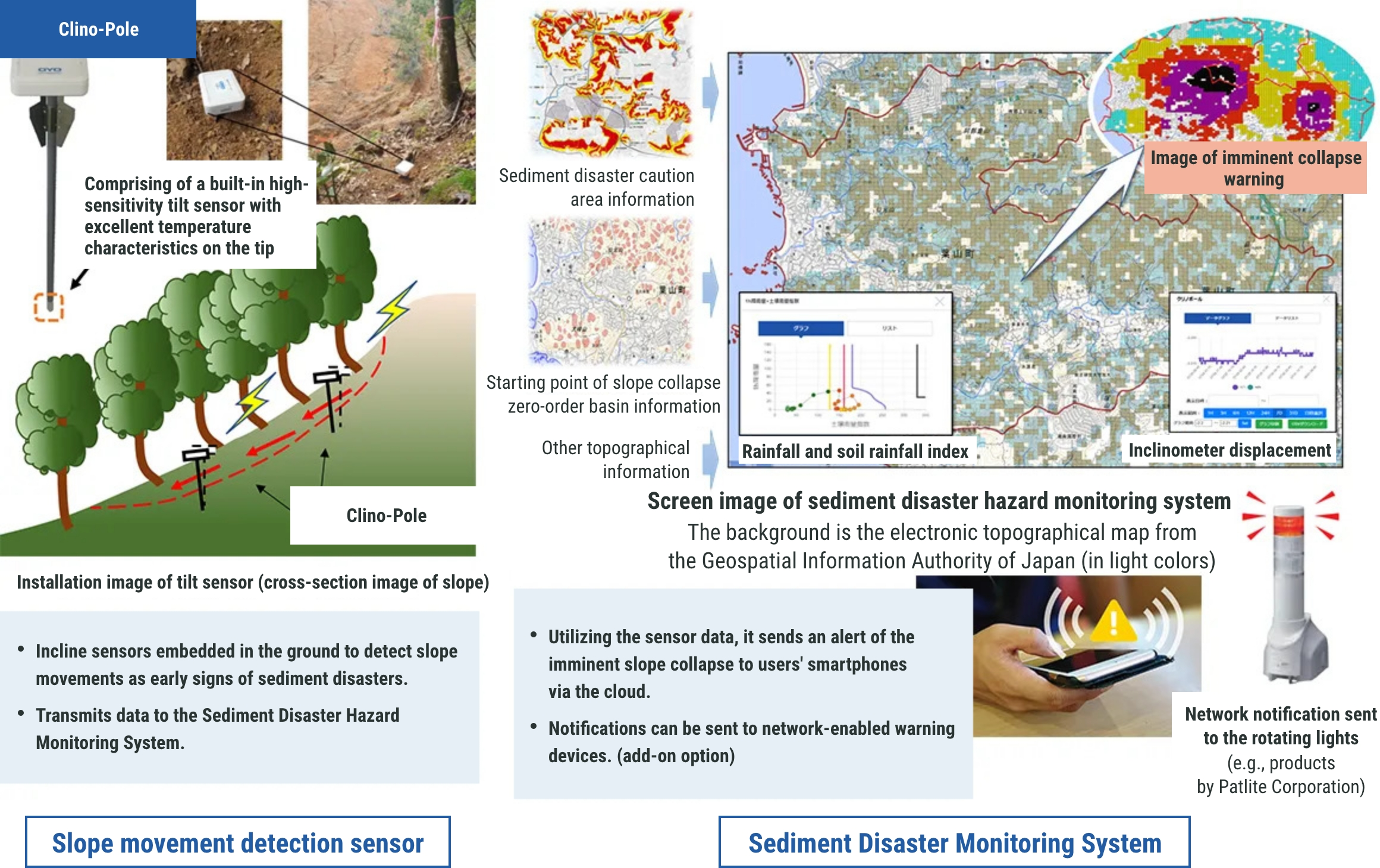
Participation in the "30by30" Alliance, an industry-government-private coalition for biodiversity
Industry-government-private coalition
Our company is committed to the "30by30" goal to conserve over 30% of the land and sea as natural ecosystems by 2030.
We have joined the "30by30 Alliance for Biodiversity" and support the international goal of stopping and reversing biodiversity loss by conserving over 30% of the land and sea as healthy
ecosystems. The "30by30 Alliance for Biodiversity" was established to achieve the domestic goals of the 30by30 initiative, bringing together voluntary cooperation from the government,
industry, and private sectors, including the Ministry of the Environment.
Our company has been conducting ongoing research and studies on ecosystem changes in the dam and river basin areas at our "OYO Bionomical Engineering Institute." They provide consulting
services for impact assessments and countermeasures related to natural environments during infrastructure development. They also actively engage in biodiversity conservation activities
through their core business, such as surveys and ecological management of exotic fish species using environmental DNA, non-destructive testing technology for assessing tree health, and the
dissemination of dryland afforestation technology in Central Asia.
Leveraging the latest technology and knowledge accumulated through these efforts to conserve biodiversity, our company is committed to contributing to the achievement of the domestic
30by30 goals and the sustainable development of society through our participation in this alliance.

The 30by30 Alliance for Biodiversity
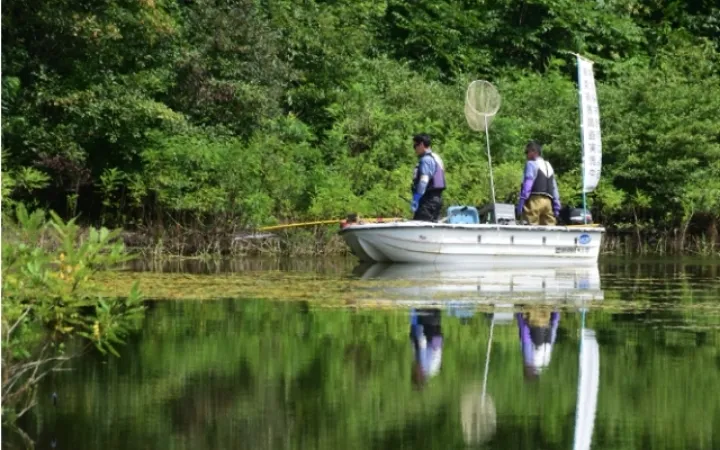
Ecological management and surveys of invasive fish species using electrofishing boats
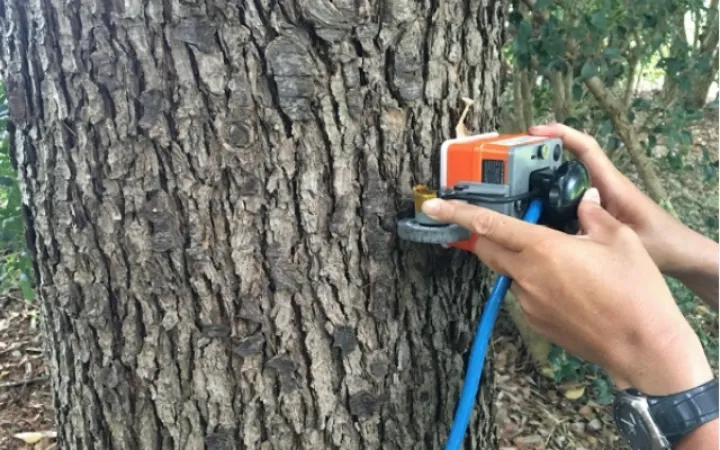
Tree health diagnosis technology
Co-creation Lab
Industry-government-private coalition
With increased climate change, frequent natural disasters, the transformation of the economy and industry through digital technology, and a shift in lifestyles due to the pandemic, our
surrounding environment is rapidly changing. On the other hand, the complexities of social and economic structures mean that the impact of natural disasters now ripples across multiple
facets of society, signifying that we have entered an era where localized responses can no longer solve the problems.
In light of these societal transformations, we recognize the need to evaluate and analyze matters from various perspectives and develop integrated problem-solving approaches; to do this,
our company launched the "Co-Creation Lab" in April 2022. The Co-Creation Lab operates with a research structure centered around open innovation, collaborating with university research
institutions, and aims to develop solutions to implement in society.
Research topics
|
Based on the Perspective (predictive) Approach Research to solve regional / societal issues |
By predicting future issues based on unprecedented events currently occurring, we establish the ideal societal and economic state that is capable of flexibly addressing these issues. Once this ideal has been set, the backcasting method is used to research and develop strategies to work towards this goal. |
| Developing problem-solving methods using an integrated and multifaceted approach | This approach differs from traditional single and localized responses and focuses on developing integrated methods for solving multifaceted issues. For example, it includes the societal implementation of comprehensive forecasting methods for the damage caused by natural disasters in today's complex society and economy. |
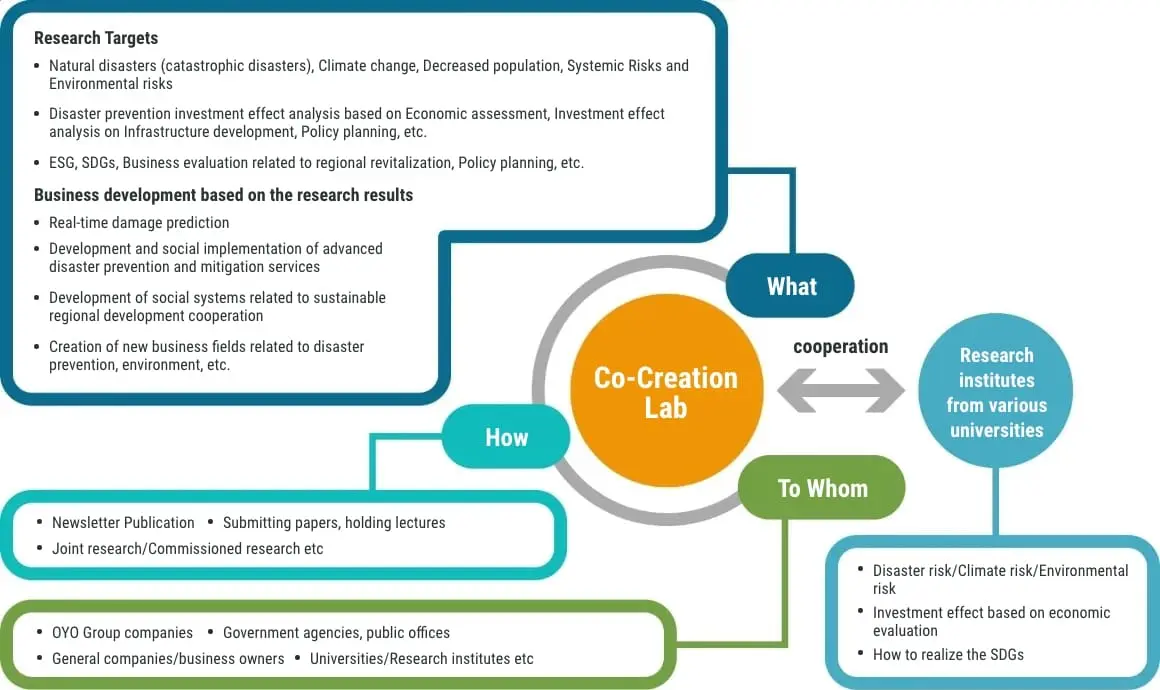
OYO&Hitachi Underground visualization service
Cross-industry cooperation
In collaboration with Hitachi, Ltd., our company has improved the "Underground Visualization Service" aimed at water / sewage / gas / electricity / telecommunications companies, infrastructure operators, construction and design companies, and introduced it as a new on-demand cloud service. This service accurately visualizes and centrally manages information about underground facilities such as gas pipelines and water supply pipes, including their locations and dimensions. It provides vital information needed for underground excavation work. The improvement to this technology, building on the evaluation and verification of underground radar surveys conducted thus far, further improves the accuracy of analyses and enables on-demand provision of buried material information, leading to increased efficiency in planning, designing, and executing extensive pipeline installations and upgrades, as well as reducing the risk of damage to buried pipes and delays in project timelines. This will significantly upgrade the maintenance and management of social infrastructure.
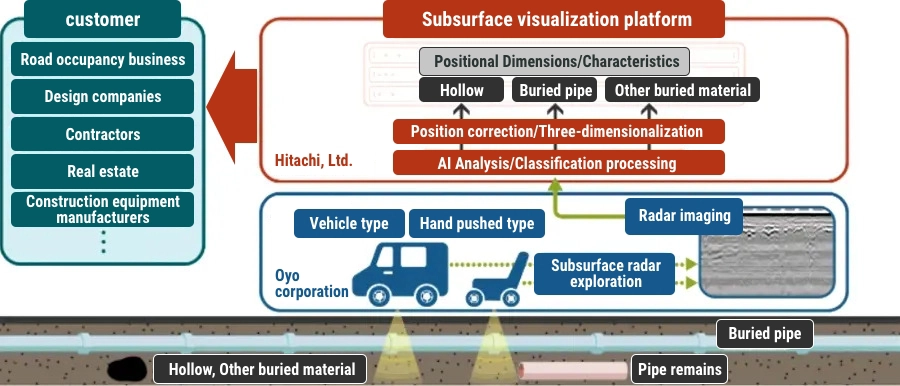
Conceptual diagram of the Subsurface Visualization Service
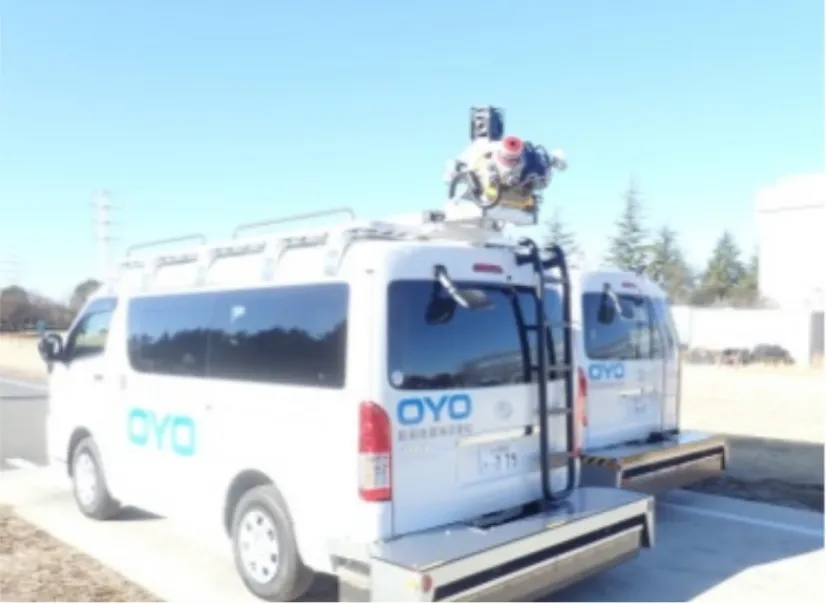
Radar probe equipped with MMS
OYO&Backcasting Technology Co., Ltd. Decarbonization and Sustainable Community Development
Cross-industry cooperation
Japan has declared its goal to achieve carbon neutrality by 2050 and has set reduction targets for greenhouse gas emissions of at least 46%, ideally 50% by 2030, compared to the levels in
2013.
Furthermore, to achieve a carbon-neutral society by 2050, the "Act on Promotion of Global Warming Countermeasures" was revised in 2021, and a roadmap was developed to create at least 100
"carbon-neutral regions" ahead of schedule by 2030 as part of the efforts toward regional decarbonization.
Japan currently faces various complex challenges threatening regional sustainability, including a declining and aging population, deteriorating regional finances, aging infrastructure, and
an increase in natural disasters. To achieve a carbon-neutral, resource-circulating, and decentralized society, it is essential to simultaneously address these challenges.
Our company and Backcasting Technology Co., Ltd are combining our expertise, including our potential assessment technology for renewable energy, probability calculation methods for
disaster risks associated with global warming, various databases concerning demographics, hazards, infrastructure, and Backcasting Technology Co., Ltd consulting services in greenhouse gas
reduction and backcasting methodology for designing future scenarios. Together, we aim to develop solutions for achieving decarbonization and sustainable regional development.
